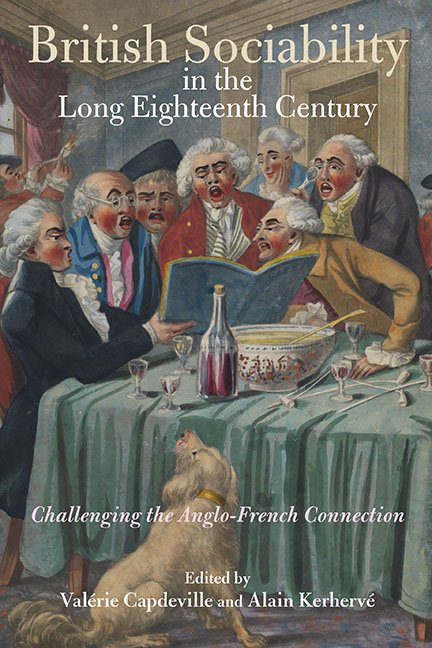Book contents
- Frontmatter
- Contents
- List of illustrations
- List of contributors
- Foreword
- Acknowledgements
- Introduction
- Part 1 Emergence of new political and social practices
- Part 2 Competing models of sociability
- Part 3 Paradoxes of British sociability
- 10 In company and out: the public/private selves of Johnson and Boswell
- 11 Friendship and unsociable sociability in eighteenth-century literature
- 12 The anti-social convivialist: toasting and resistance to sociability
- 13 Sociability and the Glorious Revolution: a dubious connection in Burke's philosophy
- 14 Respectability vs political agency: a dilemma for British radical societies
- Conclusion
- Bibliography
- Index
12 - The anti-social convivialist: toasting and resistance to sociability
from Part 3 - Paradoxes of British sociability
Published online by Cambridge University Press: 18 September 2019
- Frontmatter
- Contents
- List of illustrations
- List of contributors
- Foreword
- Acknowledgements
- Introduction
- Part 1 Emergence of new political and social practices
- Part 2 Competing models of sociability
- Part 3 Paradoxes of British sociability
- 10 In company and out: the public/private selves of Johnson and Boswell
- 11 Friendship and unsociable sociability in eighteenth-century literature
- 12 The anti-social convivialist: toasting and resistance to sociability
- 13 Sociability and the Glorious Revolution: a dubious connection in Burke's philosophy
- 14 Respectability vs political agency: a dilemma for British radical societies
- Conclusion
- Bibliography
- Index
Summary
THE LATE EIGHTEENTH century saw the flourishing of new ideas about sociability that went by the name ‘conviviality’. While drawing on much older ideas about eating and drinking together, convivial practice developed distinctive characteristics in the later part of the century, challenging earlier models of sociability described most famously by Joseph Addison and associated with the coffeehouse. Thanks in part to the work of Jürgen Habermas, coffeehouse sociability has come to be associated (however accurately) with political discussion, newspaper reading and the rise of public opinion, a process by which ideas were shaped through rational critical debate. The idea of conviviality, whose spiritual home was the tavern, is fundamentally different because of its emphasis on warm-hearted good humour. At convivial meetings argument was by-passed. The goal was not the shaping of opinion, but a celebration of ideas already affirmed. Tavern gatherings consolidated already existing beliefs and promoted harmony through their avoidance of contention, and by their ritualised celebrations of collective belief such as convivial singing and – the focus of this chapter – toasting.
Toasting formally enacted the central principles of convivial agreement. First a toast was proposed, often a pithy, witty idea or opinion intended to reflect the feelings of all those gathered; then everyone responded, signalling their assent by drinking. Differences were set aside, unanimity was asserted, and indeed unanimity, or ‘social harmony’, was the precondition for the form. This observation, obvious though it may seem, challenges much of what has been written about toasting, which usually emphasises the oppositional nature of the eighteenth-century toast. In the Jacobite toasting mentioned by Peter Clark in his book on the English Alehouse, the Spencean toasts discussed by Iain McCalman in Radial Underworld, John Barrell's discussion of toasts used in evidence during the 1794 treason trials, or Georgina Green's discussion of the Duke of Norfolk's scandalous toast to the ‘Majesty of the People’, the emphasis has most frequently been on the way toasts take up a political position, either loyalist or radical, in order to counter a perceived problem with an established system of belief. My interest in this chapter is to consider why this might be so. Given that the form of the toast is precisely not oppositional, that it is a fundamentally consensus-building form, what might the difference between its formal function and its historical instantiation reveal?
- Type
- Chapter
- Information
- British Sociability in the Long Eighteenth CenturyChallenging the Anglo-French Connection, pp. 219 - 236Publisher: Boydell & BrewerPrint publication year: 2019



